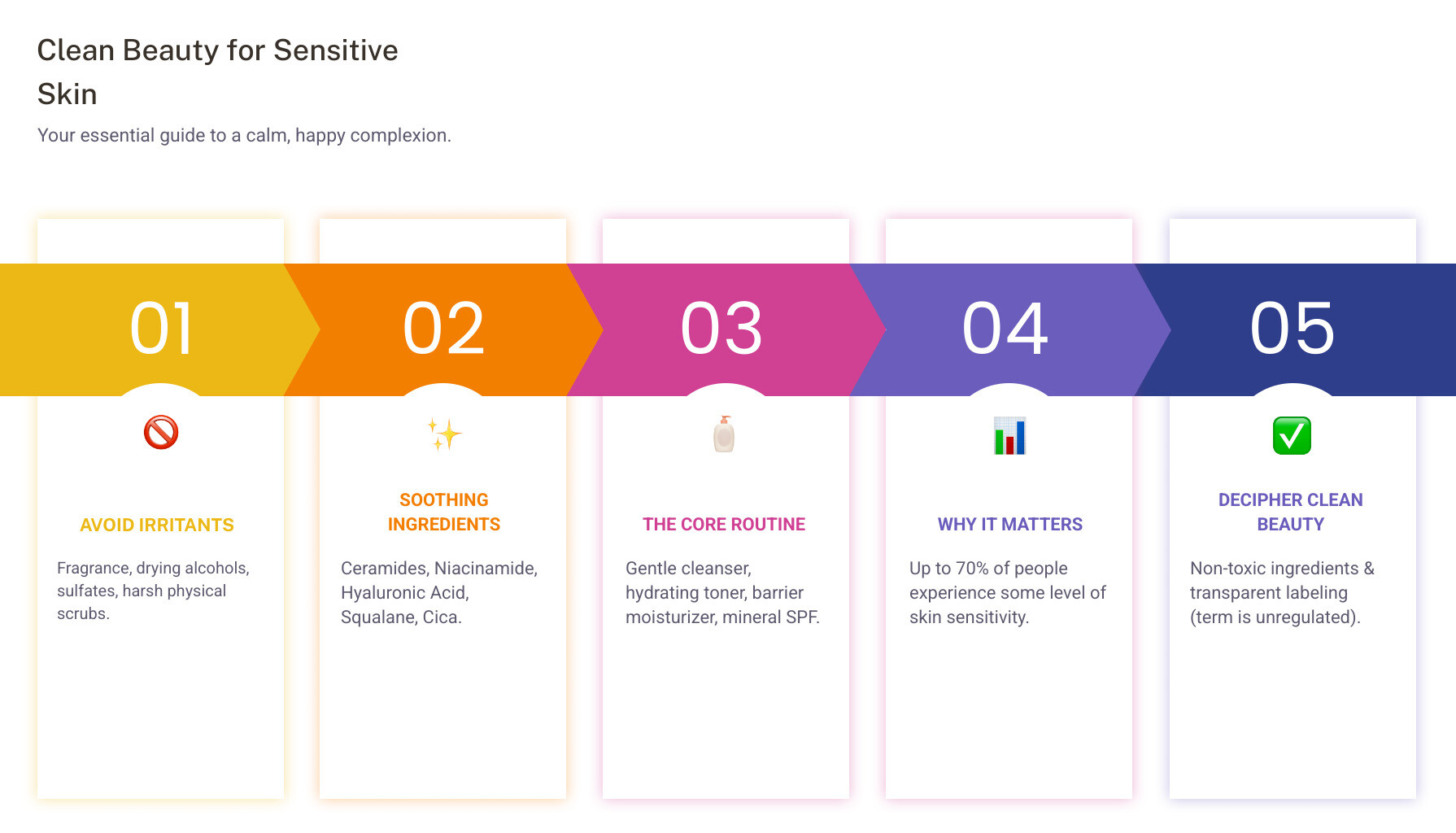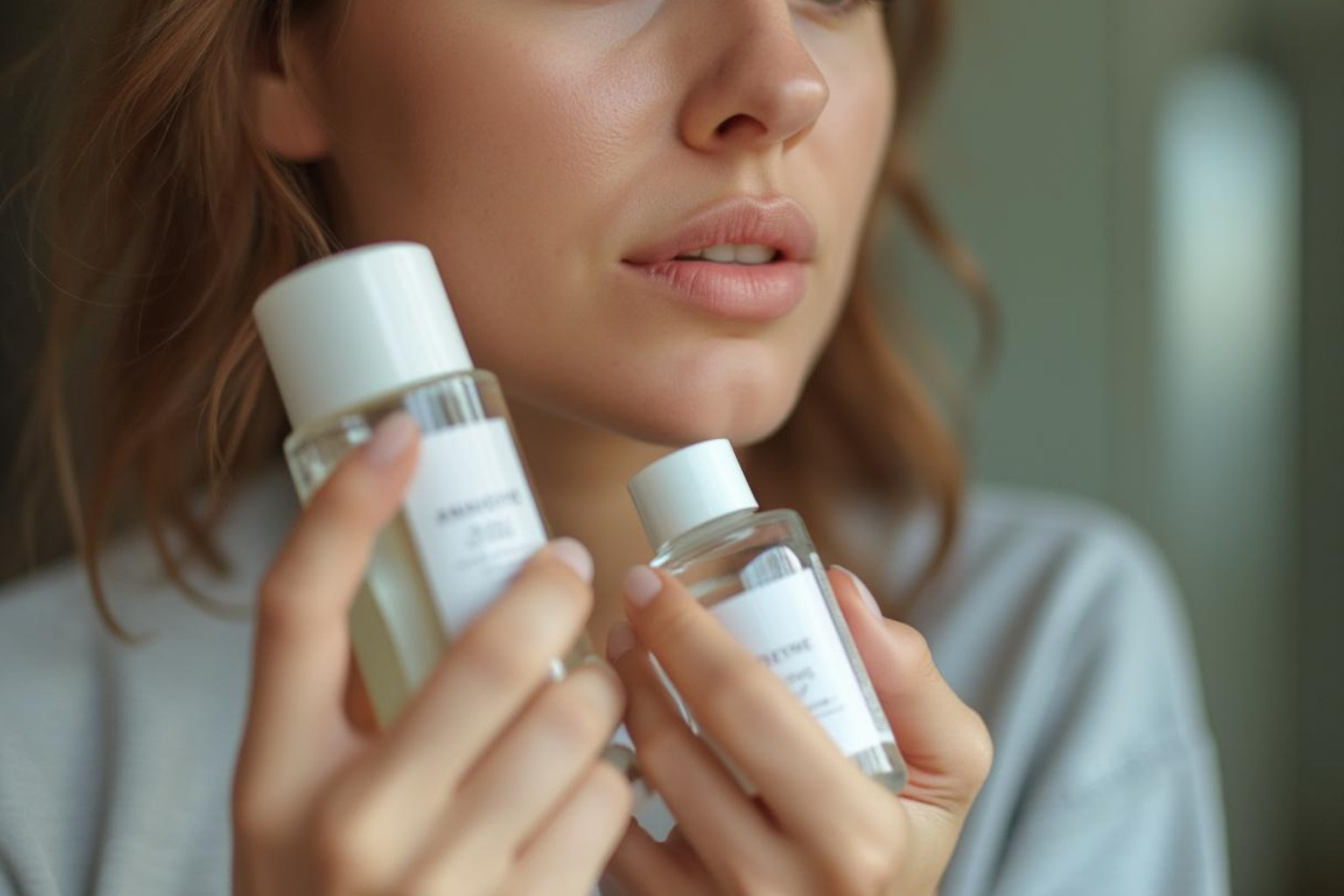Why Clean Beauty Sensitive Skin Solutions Matter More Than Ever
Clean beauty sensitive skin products have become essential for millions dealing with reactive, irritated complexions. If you’re struggling with redness, stinging, or breakouts from traditional skincare, you’re not alone – studies suggest up to 60-70% of people experience some level of skin sensitivity.
Quick answers for sensitive skin sufferers:
- Clean beauty = products with non-toxic ingredients and transparent labeling (though the term isn’t regulated)
- Key ingredients to seek: ceramides, niacinamide, hyaluronic acid, squalane
- Major irritants to avoid: fragrance, drying alcohols, sulfates, harsh scrubs
- Best approach: Simple 4-step routine with gentle, barrier-supporting products
The challenge? The clean beauty space is full of confusing marketing claims and “greenwashing.” Natural doesn’t always mean safe – poison ivy is natural, but you wouldn’t put it on your face. Meanwhile, some synthetic ingredients like lab-made hyaluronic acid can be gentler than their natural counterparts.
As one skincare expert noted: “I see people ruining their skin with one step: cleansing… It’s also the most damaging step in skincare, especially with a terribly formulated cleanser.” This highlights why choosing the right products matters so much for sensitive skin.
The good news? Once you understand what to look for (and what to avoid), building an effective routine becomes much simpler. The key is supporting your skin barrier rather than stripping it down with harsh ingredients.

Quick clean beauty sensitive skin definitions:
Decoding “Clean Beauty”: What It Really Means for Sensitive Skin
What does “clean beauty” truly mean? This term is everywhere in the beauty world, but here’s the tricky part: it’s largely unregulated. This means there isn’t one official, agreed-upon definition. For us, here at Beyond Beauty Lab, “clean beauty” means products made with non-toxic ingredients, clear and honest labeling, and a commitment to being kind to both your skin and the planet. It’s all about making smart, mindful choices.
The lack of rules means different brands can interpret “clean” in their own ways, which can feel super confusing for you! Our goal is to help you cut through that marketing noise. We want to empower you with the knowledge to spot misleading claims, really understand ingredient lists, and find brands you can truly trust, especially when you’re looking for clean beauty sensitive skin solutions.

The “Natural vs. Synthetic” Myth
One of the biggest misunderstandings in the clean beauty world is thinking that “natural is always good, and synthetic is always bad.” But for sensitive skin, that couldn’t be further from the truth! Think about it: poison ivy is 100% natural, but you definitely wouldn’t want it anywhere near your face, right?
Many natural ingredients, like certain essential oils (yes, even popular ones like lavender or tea tree), citrus extracts, or some other botanical ingredients, can actually be major irritants or allergens for delicate skin. In fact, studies show that fragrance allergies are quite common, and many fragrances come from natural sources.
On the flip side, some synthetic ingredients are carefully created in labs to be incredibly gentle, stable, and super effective for sensitive skin. We’re talking about things like lab-made hyaluronic acid, ceramides, or panthenol (which is a form of Vitamin B5). These ingredients often mimic what your skin already produces naturally, or they’re designed to work wonders without the impurities or allergy risks you sometimes find in natural plant extracts. So, the real secret isn’t whether an ingredient is natural or synthetic, but how thoughtfully it’s made, how pure it is, and if it’s proven safe and effective for your sensitive skin.
How to Spot Greenwashing and Find Trustworthy Brands
As “clean” and “green” beauty became popular, so did “greenwashing.” This is when brands make vague, misleading claims about being natural or eco-friendly just to seem better than they are. They might use buzzwords like “all-natural,” “pure,” or “eco-friendly” without any real proof or oversight.
So, how do you find brands you can really trust for your clean beauty sensitive skin routine? Look for these key signs:
First, they should offer full ingredient transparency. Trustworthy brands will clearly list all their ingredients. They’ll often even explain what each one does and why it’s in the product. No hiding behind secret “proprietary blends” here!
Second, they provide clear explanations. Look for brands that genuinely teach you about their products, giving you the science behind their formulas instead of just fancy words.
Third, check for third-party certifications. While “clean” isn’t regulated by the government, some independent groups offer their stamp of approval. For example, MADE SAFE certifies products free from many known harmful chemicals, and EWG Verified ensures products meet strict health standards. You might also see Leaping Bunny for cruelty-free products or USDA Organic for truly organic agricultural ingredients (though this is less common for finished beauty items). These seals can give you extra peace of mind.
Fourth, consider minimalist formulations. For sensitive skin, “less is often more.” Products with shorter, simpler ingredient lists usually mean fewer potential triggers that could cause irritation. As many skincare pros will tell you, focusing on a few effective ingredients is often better than a long, complex list.
Finally, look into the brand’s mission and values. Do they genuinely care about safety and their community, or is it just clever marketing? Your own careful research and a bit of detective work are your best tools!
The Ultimate Ingredient Guide for Your Clean Beauty Sensitive Skin Routine
Empowering yourself with ingredient knowledge is truly like gaining a superpower for your skin! It means you can confidently pick out products that will love your complexion, and easily skip those that might cause frustrating flare-ups. When it comes to finding the best clean beauty sensitive skin solutions, knowing what to accept and what to avoid is absolutely key.
To help you steer skincare ingredients, here’s a quick overview of what to look for and what to steer clear of:
| Category | Example Ingredients | Why they’re good/bad for sensitive skin |
|---|---|---|
| Soothing Superstars | Ceramides, Niacinamide, Hyaluronic Acid, Squalane, Centella Asiatica, Colloidal Oatmeal, Bakuchiol | These ingredients are known to calm, hydrate, and strengthen the skin barrier, reducing irritation and promoting healing. |
| Potential Irritants (Red Flags) | Fragrance, Drying Alcohols, Sulfates, Harsh Physical Scrubs, Certain Chemical Sunscreens | Can strip the skin’s natural oils, disrupt the skin barrier, or trigger allergic reactions and inflammation. |
Soothing Superstars: Ingredients to Accept for Clean Beauty Sensitive Skin
These ingredients are like your skin’s best friends – generally well-tolerated and incredibly beneficial for sensitive, reactive skin. They work hard to calm irritation, strengthen your skin’s protective barrier, and deliver essential hydration.
Let’s meet some of these skin-loving heroes:
First up, Ceramides. Think of ceramides as the “mortar” between your skin cells, holding everything together. They are vital for supporting and repairing your skin barrier, which is your first line of defense against irritants.
Then there’s Niacinamide, also known as Vitamin B3. This powerhouse ingredient is fantastic for calming redness, reducing inflammation, and strengthening your skin’s overall resilience. It’s a true multi-tasker!
For deep, yet weightless hydration, look no further than Hyaluronic Acid. It’s like a moisture magnet, drawing water into your skin without feeling heavy or sticky.
Next, we have Squalane. This is a wonderfully lightweight and non-comedogenic (meaning it won’t clog pores) moisturizer that mimics your skin’s natural oils, providing a soft, supple feel.
You might have heard of Centella Asiatica, often called Cica. This ancient botanical extract is a superstar for soothing irritated skin and helping it heal and recover.
Feeling itchy or irritated? Colloidal Oatmeal is your go-to. This finely ground oat flour is a centuries-old remedy known for its ability to relieve itching and soothe inflamed skin.
Finally, for those seeking a gentle alternative to retinol, meet Bakuchiol. This plant-based ingredient offers similar benefits to retinol – like helping with fine lines and uneven skin tone – but with much less risk of irritation, making it perfect for sensitive complexions.
Red Flags: Common Irritants to Avoid in Your Clean Beauty for Sensitive Skin Routine
Just as there are ingredients that nurture sensitive skin, there are others that often act like uninvited guests, causing trouble. These “red flag” ingredients can strip your skin, trigger reactions, and generally make life miserable for a delicate complexion. Steering clear of them is a huge step towards a calmer, happier face.
Here are the top culprits to watch out for:
First and foremost: Fragrance. This is perhaps the biggest allergen and irritant for sensitive skin. Whether it’s synthetic or “natural” (like essential oils), fragrance can cause redness, itching, and breakouts. Many brands use “fragrance” or “parfum” to hide a cocktail of chemicals, so it’s best to avoid it entirely if your skin is reactive.
Next, be wary of Drying Alcohols. While some beneficial fatty alcohols exist, ingredients like ethanol, isopropyl alcohol, or alcohol denat. can strip your skin of its natural, protective oils, leaving it dry, tight, and more vulnerable to irritation.
Sulfates (SLS/SLES) are harsh cleansing agents often found in foaming cleansers. They can create a satisfying lather, but they also tend to be too aggressive for sensitive skin, disrupting the skin barrier and leading to dryness and irritation. Opt for sulfate-free formulas instead.
When it comes to exfoliation, Harsh Physical Scrubs are a definite no-no. Abrasive particles like crushed nuts or large sugar crystals can create micro-tears in your skin, damaging your delicate skin barrier and causing inflammation. Gentle chemical exfoliants (like very low concentrations of PHAs or Mandelic Acid) are usually a safer bet, but even then, introduce them slowly.
Lastly, pay attention to your sunscreens. While sunscreen is non-negotiable, Certain Chemical Sunscreens (like oxybenzone or avobenzone) can sometimes cause sensitivity or allergic reactions in very reactive skin. Mineral sunscreens, which use Zinc Oxide or Titanium Dioxide, are generally considered a safer and gentler option for sensitive complexions.







